Einleitung
Diese Anleitung zeigt dir, wie du ein kaputtes optisches Laufwerk austauschen kannst.
Werkzeuge
-
-
Befestige einen Saugnapf in jeder der oberen Ecken der Scheibe.
-
Wenn der Saugnapf sich nicht festsaugt, dann versuche die Scheibe und den Saugnapf mit einem milden Reinigungsmittel zu säubern.
-
-
-
Hebe die Scheibe vorsichtig senkrecht zum LCD an, gerade soweit um die Metallstifte, die oben an der Unterseite der Scheibe angebracht sind zu befreien.
-
Ziehe die Scheibe von der Unterkante des iMac weg und lege sie sorgfältig zur Seite.
-
-
-
Ziehe den Verbinder am Kabel der Vertikalsynchronisation aus seinem Sockel auf der Platine der LED Versorgung in der Nähe der oberen linken Ecke des iMac.
-
-
-
Drehe das Display soweit aus dem Gehäuse heraus, dass du das Versorgungskabel der LED Rückbeleuchtung von der LED Versorgungsplatine lösen kannst.
-
-
-
Ziehe das Display vorsichtig in Richtung Oberkante des iMac und hebe es aus dem Gehäuse. Achte darauf, dass sich keine Kabel verfangen.
-
-
-
Entferne folgende vier Torx Schrauben:
-
Eine 9,3 mm T10 Schraube mit breitem Kopf
-
Drei 9,3 mm T10 Schrauben mit normalen Köpfen
-
-
-
Löse den Verbinder zum Thermosensor am optischen Laufwerk aus seinem Sockel auf dem Logic Board, indem du ihn in Richtung Oberkante des iMac ziehst.
-
-
-
Hebe die innere Kante des optischen Laufwerks an und bewege seinen Verbinder am GPU Rahmen, der am Logic Bordbefestigt ist, vorbei.
-
Ziehe das optische Laufwerk vorsichtig aus den Befestigungsstiften an der rechten Seite des äußeren Gehäuses, damit du etwas Platz gewinnst, um das Kabel des optischen Laufwerks lösen zu können.
-
Lasse das optische Laufwerk herunterhängen, während du den Verbinder zum Thermosensor am optischen Laufwerk hinter dem Kühlkörper der GPU herauslöst.
-
-
-
Löse den Anschluss vom optischen Laufwerk indem du den Verbinder vom Laufwerk weg ziehst.
-
Entferne das Laufwerk vom iMac.
-
-
-
Löse den rot markierten Teil des Aluminiumbands ab, der am Laufwerk klebt. Der Rest an der schwarzen Plastikhalterung kann bleiben.
-
-
-
Entferne die beiden T10 Torx Schrauben auf jeder Seite des optischen Laufwerks, also insgesamt vier.
-
-
-
Drehe die Halterung leicht weg vom Laufwerk.
-
Ziehe die Halterung weg vom offenen Ende des optischen Laufwerks, achte dabei darauf, dass sich keine Kabel verfangen.
-
-
-
Löse das Stück verklebten Schaumstoff mit der Spudgerspitze vom Thermosensor des optischen Laufwerks ab.
-
Heble vorsichtig mit dem flachen Ende des Spudgers den Thermosensor aus der Verklebung mit dem optischen Laufwerk.
-
Um dein Gerät wieder zusammenzusetzen, folge den Schritten in umgekehrter Reihenfolge.
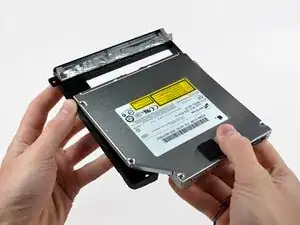
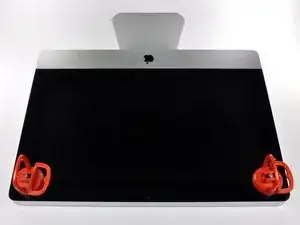
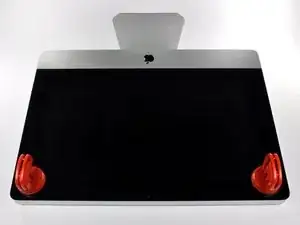
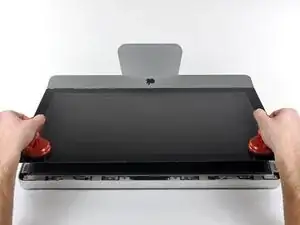
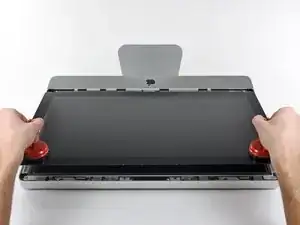
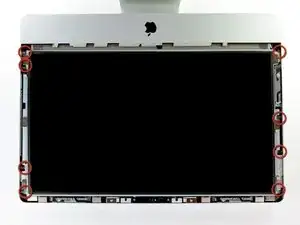
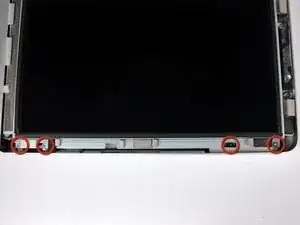
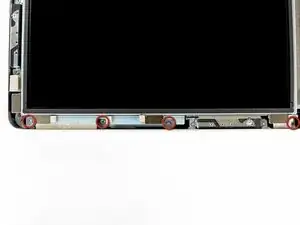
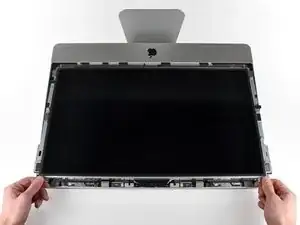
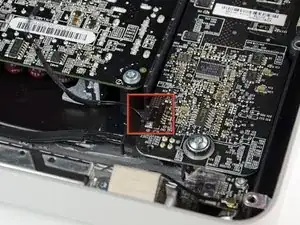
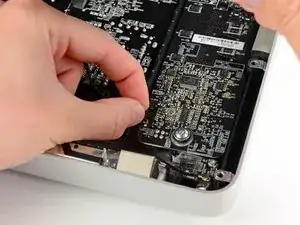
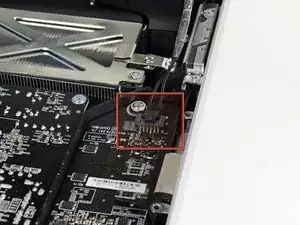
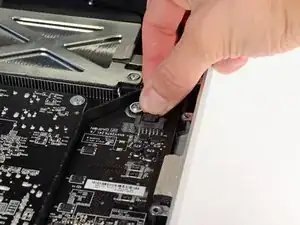
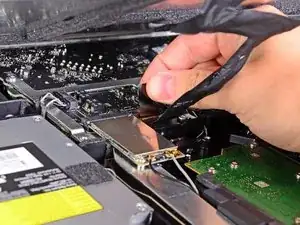
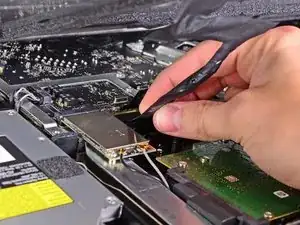
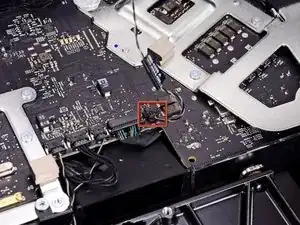
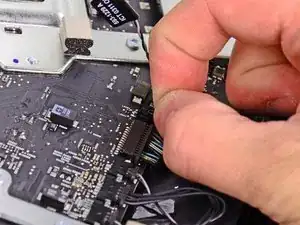
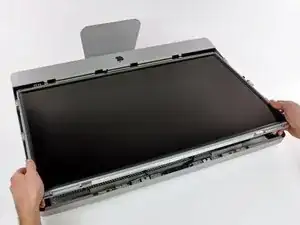
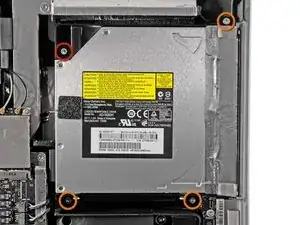
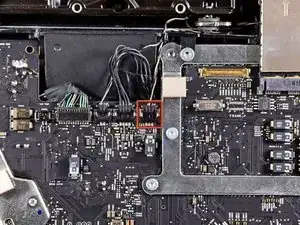
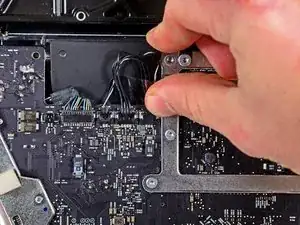
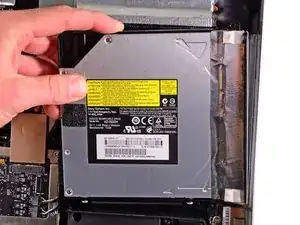
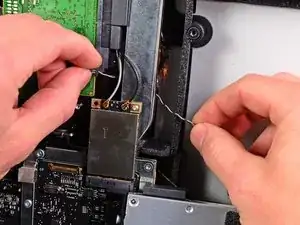
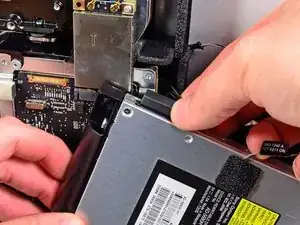
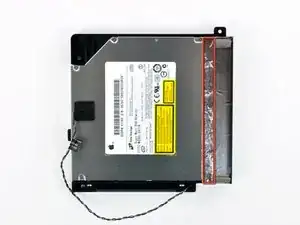
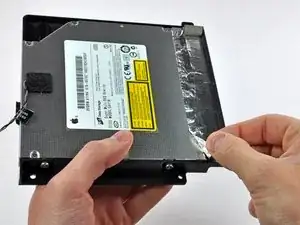
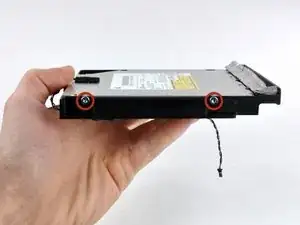
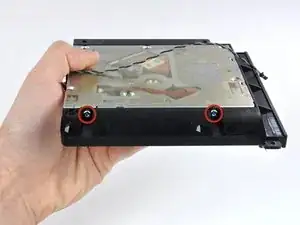
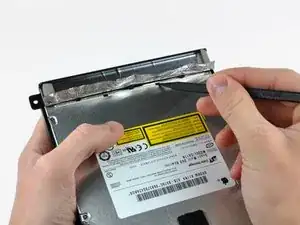
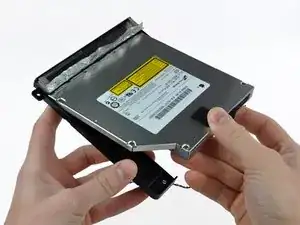
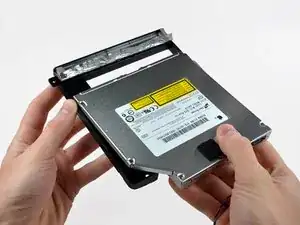
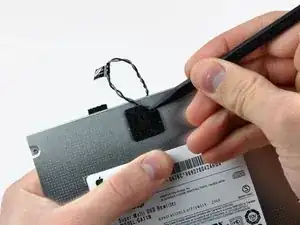
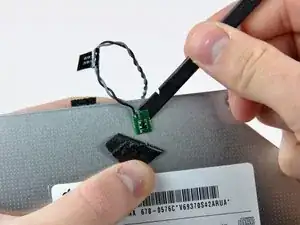

Very easy to lift the glass out. Don't jerk too hard.
kctipton -
Another comment on DATA & LCD Temp. Sensor cables: I had to remove the vertical sync, and the backlight cable, however, if you have an assistant or/can carefully rotate the screen clockwise/and then have it held up about 5" to 6" at a slight angle, you do not need to remove LCD data cable or LCD thermal cable, however - IMPORTANT: you must have a second pair of hands/or way to securely prop up the LCD. Also, don't rotate too much, since then you will pull out LCD data cable, and it renders the whole exercise moot, or can damage the cable or connector.
MaximBorzov -
You don't need suction cups. The screen, held by magnets, can simply be pried off using a very thin blade such as a screw driver and fingers.
Deepsurvival -
That's a bad idea. using a metal tool to pry off glass is likely to end with an expensive broken front glass.
Suction cups are common. Find a couple and do it the safe way. I use some cheap ones that came with iPhone repair kit.
max damage -
No need for suction cups, I just stuck my nails (short like guys usually have) between the top part of the screen and body, and it came off easily. I've never done it before, so it seems to be very easy.
Nikolas Lintulaakso -
Nails worked for me too
Rob Dale -
Just completed the replacement of the optical drive with an SSD using an OWC Data Doubler kit. Attempted to remove the optical drive without disconnecting any cables but found it a bit fiddly to orient the screen for good access. I bit the bullet and disconnected them and found the process less daunting than I imagined. Reconnecting them was similarly straightforward if you're careful.
Tip: you can skip the step for removing the optical drive thermal sensor connector from the motherboard. Still need to remove the sensor from the optical drive but you can leave that hanging and reattach it to the SSD later.
osienna -
I use Garmin GPS suction cup. Work very well
jc3Dcx -
I’ve just successfully installed a 1TB SSD in place of my optical drive thanks to the information here- thank you to everyone who has contributed!
3 comments- the procedure described here seems to vary between HD replacement and dual HD/optical drive replacement. This can be confusing at times.
Expect there to be minor differences between the layout described and what you find when you open up your iMac. There are also, surprisingly, differences between the HD enclosure description, and the article provided by ifixit.
I was able to replace the DVD/HD enclosure single-handedly without fully removing the LCD, or deconnecting any of the cables (steps 5-11). It’s a bit cramped, and fiddly, but I was not happy removing any of the cables despite watching videos, etc., since they all seemed to involve applying more force than I was comfortable with. A more detailed description of how to release them might have helped, but even here, there may be minor variations even within the 2389 model.
Good luck!
ivan birks -
I did it several times with one suction cup at the end of a kitchen brush. Once with the blade of a swiss army knive, also ok. And i’m pretty sure it works with fingernails too
Tai -
Fingernails are all you need to free the glass from its magnetic hold. If you don’t have them, slip something thin and plastic, like a spudger, at a top corner.
Max Powers -
Minha dúvida é a seguinte: após o técnico trocar o HD do meu iMac de 21,5 polegadas, a câmera parou de funcionar. Seria por causa da troca do HD? Tem solução?
Claudio -
Creio que o cabo da camera não foi plugado ou deu mau contato… ou até danificado.
glecyo@gmail.com
glecyo medeiros -
I can’t get my glass to budge. I’m replacing a cracked one and now it’s about to shatter.
jamboxmitchell -
I know that I'm replying really late but I advise to use clear tape over any cracks so the cracks don't get bigger
Jace Holmes -
Check for chips in the glass BEFORE you do this step. If there is a chip when you pull up with the suction cups you will wind up with a jagged mess. If you do have a chip I would advise covering the screen near the chip with clear tape of some kind before lifting out. Mine shattered right at the chip and the resulting glass dust cloud got all over. My solution was buying a new glass screen.
BCam -